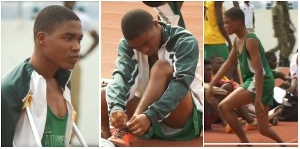Bolgatanga, Feb. 28, GNA - Mrs Angelina Baiden-Amisah, Deputy Minister of Education and Sports, on Monday directed heads of basic schools to stop the practice of asking pupils to go home for non-payment of Parent-Teacher Association (PTA) levies.
She observed that the practice was undermining public confidence in the Capitation Grant introduced by the Government recently. "Henceforth, no child should be sent home because of any kind of fees," she stressed; suggesting that PTAs could collect such levies from parents and handover the proceeds to their respective school heads. Mrs Baiden-Amisah issued the directive when she went round some basic schools in Bolgatanga and Sumbrungu in the Upper East Region to monitor the implementation of the Capitation Grant and assess the textbook supply situation.
The inspection tour took her to six schools where she interacted with the heads, staff and pupils.
At the Sacred Heart Primary/JSS in Bolgatanga, the Headmistress of the school, Madam Rose Bacheyie said enrolment had soared since the inception of the Grant, with girl enrolment particularly going up from 15 per cent to 30 per cent.
Shortage of textbooks and furniture too was now a thing of the past, she added.
Mrs Bibiana Kumagye, Headmistress of St. Charles Primary School, told the Deputy Minister that the introduction of the Capitation Grant had enhanced the quality of teaching and learning, as school heads were now able to purchase basic classroom stationery and carry out minor repair works.
At the St. John's Junior Secondary School the Headmistress, Madam Victoria Adimazoya, said drop-out rate in the school had declined considerably with the introduction of the Capitation Grant. She said pupils who previously stayed away from school due to non-payment of fees now had access to fee-free education. Mrs Janet Tambro, Headmistress of the Sumbrungu Primary School, also announced that pupil enrolment in the school had shot up from 390 to 484 with the introduction of the Grant.
She, however, appealed to the Deputy Minister to help solve the school's acute water problem. Pupils had to travel about half a mile to Sherigu to fetch water, she said.
In her remarks, Mrs Baiden Amisah said she was impressed about the dedication and serious attitude of the school heads, staff and pupils in all the schools visited.
"Even though the head teachers and staff did not have prior notice about my visit, they were all at post going about their work diligently, and I must commend them for that".
Commenting on the requests by some of school heads for an increase in the Capitation Grant, Mrs Baiden-Amisah indicated that the prevailing rate was 30,000 cedis per pupil, and would remain at that for the meantime, to enable Government assess the impact of the exercise. Amounts received by the schools as first allocation of the Grant ranged between six million cedis and 12 million cedis. However, none of the schools had received the second allocation, although the Deputy Minister affirmed that those monies would have been credited to their various bank accounts by now.
Pertinent issues arising from the tour included the need for more classroom infrastructure to accommodate the increasing enrolment figures, as the shift system was still being run in some schools in the region.
There was also an initial uncertainty on the part of school heads as to whether the Capitation Grant covered the printing of examination papers. The Deputy Minister cleared the air, indicating that the Grant was also meant to cater for examinations, which formed part of academic work.
The Regional Director of Education, Mr Ken Dabuo, who conducted the Deputy Minister around, said the current state of education in the region was satisfactory, considering the resources government continued to pump into the sector. He expressed the hope that the trend would continue.
General News of Tuesday, 28 February 2006
Source: GNA
















